The Use of Antidepressants in Dementia in the Elderly in Nursing Homes
Added on 2022-12-29
52 Pages13064 Words74 Views
Running head: DISSERTATION
The use of antidepressant in dementia in the elderly in Nursing homes (65&85 years)
Name of the Student
Name of the University
Author Note
The use of antidepressant in dementia in the elderly in Nursing homes (65&85 years)
Name of the Student
Name of the University
Author Note
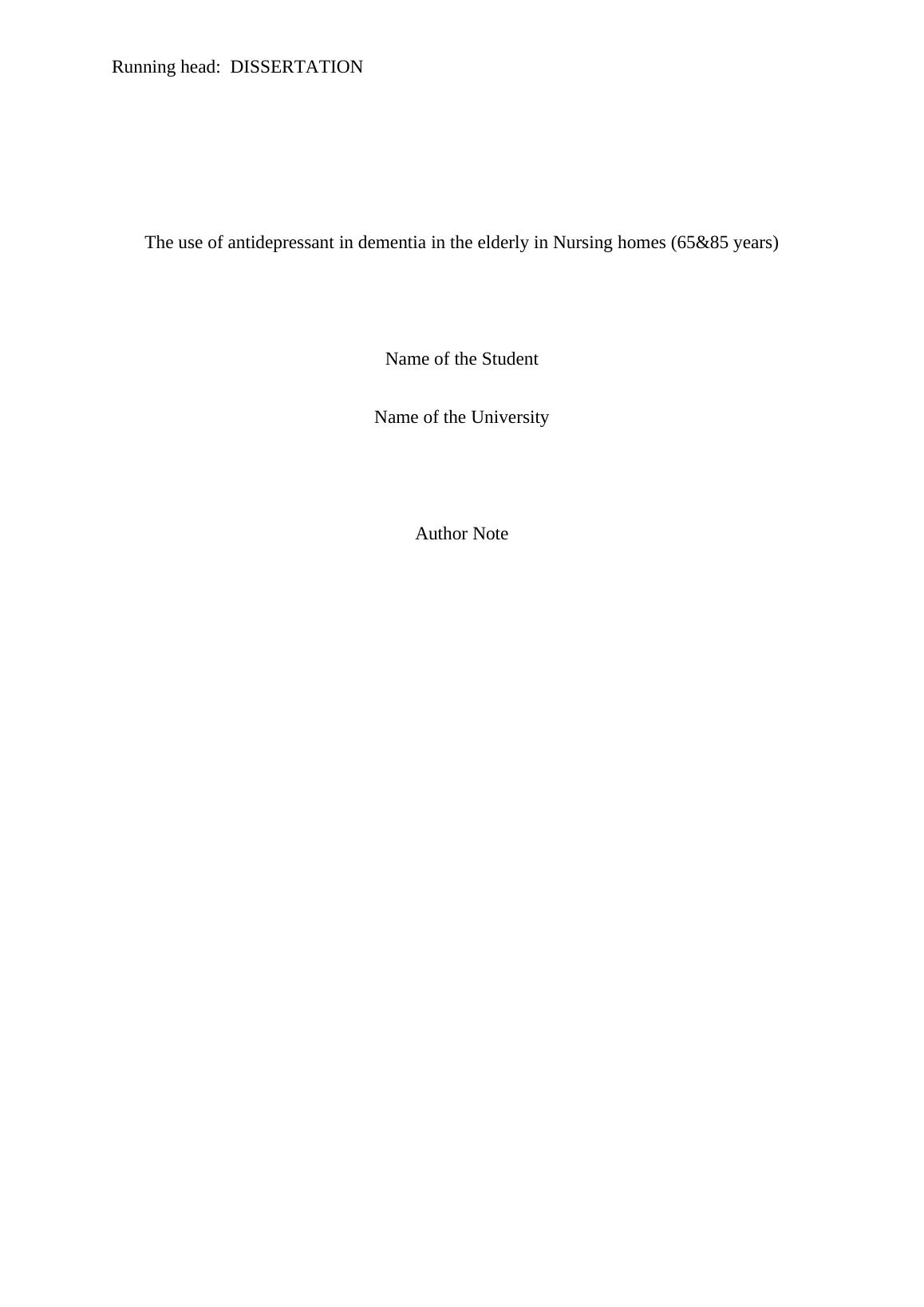
1DISSERTATION
Abstract
Dementia is defined as loss of cognitive functioning – thinking, logical reasoning and
remembering. In England, approximately 676,000 people are estimated to have dementia.
Anti-depressants are one of the commonly perspective drugs that are used for the treatment of
depressive symptoms among the older adults with dementia. This research was conducted in
the form of a systematic review taking into consideration the fact that the method facilitated
adopting a systematic method for collecting secondary data. The steps were conducted by two
individual investigators, following which differences were set by partaking in group
discussions that caused modification and alteration of the search standards. This led to the
exclusion of 27 articles, and only 6 were finally incorporated in the thematic analysis. The
pharmacological therapy and the non-pharmacological therapy can be very useful in
improving the condition of the dementia patients having depression. Most of the studies
identified that the nurses had lack of knowledge regarding the condition that is dementia
along with depression. Therefore, it can be said that, nurses need more knowledge regarding
the problem as well. However, a few studies also identified that the experience of the nurses
are also very crucial. Non-pharmacological interventions can be implemented effectively for
the treatment of depressive symptoms among the older adults with dementia and nurses
required additional training in order to implement the non- pharmacological intervention as
well as training related to the person- centered care for dementia patients.
Abstract
Dementia is defined as loss of cognitive functioning – thinking, logical reasoning and
remembering. In England, approximately 676,000 people are estimated to have dementia.
Anti-depressants are one of the commonly perspective drugs that are used for the treatment of
depressive symptoms among the older adults with dementia. This research was conducted in
the form of a systematic review taking into consideration the fact that the method facilitated
adopting a systematic method for collecting secondary data. The steps were conducted by two
individual investigators, following which differences were set by partaking in group
discussions that caused modification and alteration of the search standards. This led to the
exclusion of 27 articles, and only 6 were finally incorporated in the thematic analysis. The
pharmacological therapy and the non-pharmacological therapy can be very useful in
improving the condition of the dementia patients having depression. Most of the studies
identified that the nurses had lack of knowledge regarding the condition that is dementia
along with depression. Therefore, it can be said that, nurses need more knowledge regarding
the problem as well. However, a few studies also identified that the experience of the nurses
are also very crucial. Non-pharmacological interventions can be implemented effectively for
the treatment of depressive symptoms among the older adults with dementia and nurses
required additional training in order to implement the non- pharmacological intervention as
well as training related to the person- centered care for dementia patients.
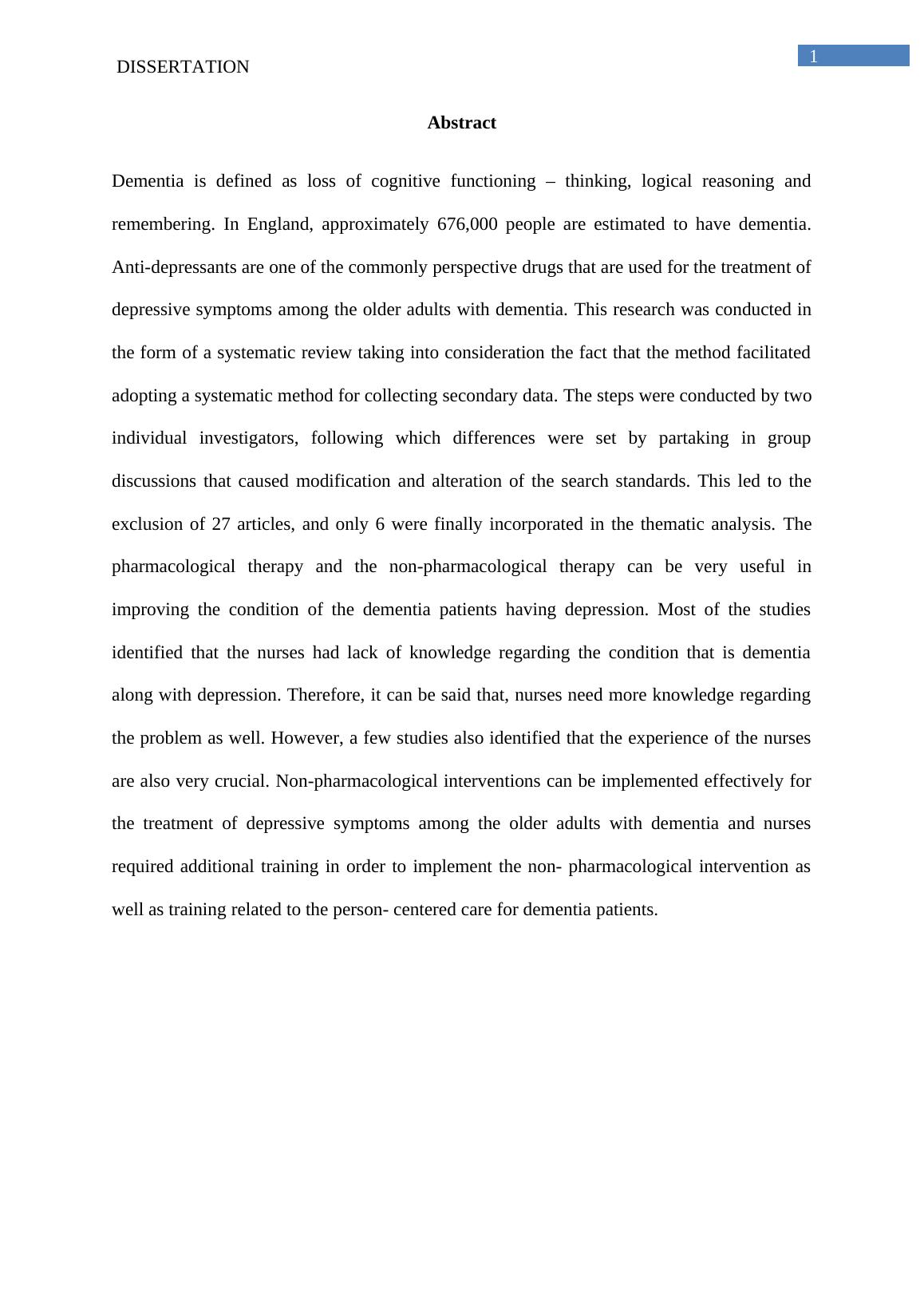
2DISSERTATION
Table of Contents
Introduction................................................................................................................................3
Literature Review.......................................................................................................................6
Association of depression and dementia among the older adults..........................................6
Person-centred care and dementia..........................................................................................8
Pharmacological and non-pharmacological interventions for depression management........9
Specified pharmacological interventions for depression management in dementia............11
Specified non-pharmacological interventions for depression management in dementia.....12
Summary of the review and gap in research........................................................................14
Rationale of the review........................................................................................................16
Methodology............................................................................................................................16
Search terms.........................................................................................................................19
Relevance assessment..........................................................................................................20
Results:.....................................................................................................................................20
Discussion................................................................................................................................32
Limitation.................................................................................................................................36
Conclusion and Recommendation:..........................................................................................37
References................................................................................................................................39
Appendix 1...............................................................................................................................46
Appendix 2...............................................................................................................................47
Table of Contents
Introduction................................................................................................................................3
Literature Review.......................................................................................................................6
Association of depression and dementia among the older adults..........................................6
Person-centred care and dementia..........................................................................................8
Pharmacological and non-pharmacological interventions for depression management........9
Specified pharmacological interventions for depression management in dementia............11
Specified non-pharmacological interventions for depression management in dementia.....12
Summary of the review and gap in research........................................................................14
Rationale of the review........................................................................................................16
Methodology............................................................................................................................16
Search terms.........................................................................................................................19
Relevance assessment..........................................................................................................20
Results:.....................................................................................................................................20
Discussion................................................................................................................................32
Limitation.................................................................................................................................36
Conclusion and Recommendation:..........................................................................................37
References................................................................................................................................39
Appendix 1...............................................................................................................................46
Appendix 2...............................................................................................................................47
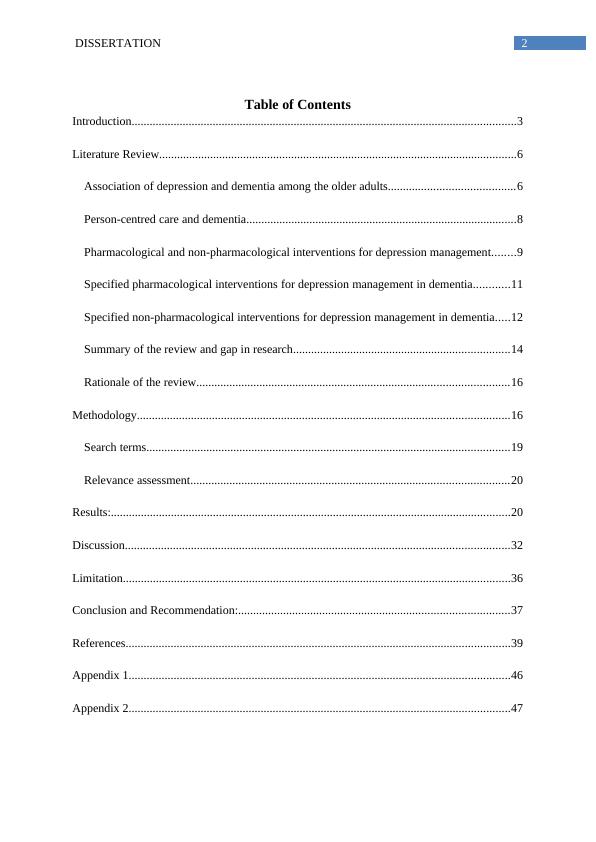
3DISSERTATION

4DISSERTATION
Introduction
Dementia is defined as loss of cognitive functioning – thinking, logical reasoning and
remembering and other behavioural abilities to such an extent that it interferes with the ability
of a person to conduct the activities of daily living (ADLs) independently. The cognitive
functioning includes memory, visual perception, communication skills, problem solving
skills, ability of pay attention of focus and management of self. Few people suffering from
dementia fails to control their emotions leading to change in their personality. Dementia
ranges in severity starting from mildest stage to severe stage when one person becomes
completely dependent on others for executing ADLs. Signs and symptoms of dementia
surface when the neurons (nerve cells) which were once healthy lose their connection with
the other brain cells and die. Loss of function of neurons is common with the process of aging
but people suffering from dementia experience greater loss of neurons. Dementia is common
as the people grow older. Half of all people who are aged 65 years and above or between 80
to 85 years of age have dementia but it is not a process of normal aging. The cause of
dementia varies depending on the changes in the brain. Alzheimer’s disease is the most
common cause of dementia among the older adults. Other form of dementia includes Lewy
body dementia, vascular dementia, and frontotemporal disorders.
Dementia is a growing challenge in the UK. In England, approximately 676,000
people are estimated to have dementia. Dementia mainly affects the older people who are 65
years of age or older. The likelihood of developing dementia increases with age and doubles
with ever 5-year. There are around 540,000 carers of people with dementia in England. It is
estimated that one of the three nurses care for person with dementia during their professional
tenure.
Introduction
Dementia is defined as loss of cognitive functioning – thinking, logical reasoning and
remembering and other behavioural abilities to such an extent that it interferes with the ability
of a person to conduct the activities of daily living (ADLs) independently. The cognitive
functioning includes memory, visual perception, communication skills, problem solving
skills, ability of pay attention of focus and management of self. Few people suffering from
dementia fails to control their emotions leading to change in their personality. Dementia
ranges in severity starting from mildest stage to severe stage when one person becomes
completely dependent on others for executing ADLs. Signs and symptoms of dementia
surface when the neurons (nerve cells) which were once healthy lose their connection with
the other brain cells and die. Loss of function of neurons is common with the process of aging
but people suffering from dementia experience greater loss of neurons. Dementia is common
as the people grow older. Half of all people who are aged 65 years and above or between 80
to 85 years of age have dementia but it is not a process of normal aging. The cause of
dementia varies depending on the changes in the brain. Alzheimer’s disease is the most
common cause of dementia among the older adults. Other form of dementia includes Lewy
body dementia, vascular dementia, and frontotemporal disorders.
Dementia is a growing challenge in the UK. In England, approximately 676,000
people are estimated to have dementia. Dementia mainly affects the older people who are 65
years of age or older. The likelihood of developing dementia increases with age and doubles
with ever 5-year. There are around 540,000 carers of people with dementia in England. It is
estimated that one of the three nurses care for person with dementia during their professional
tenure.
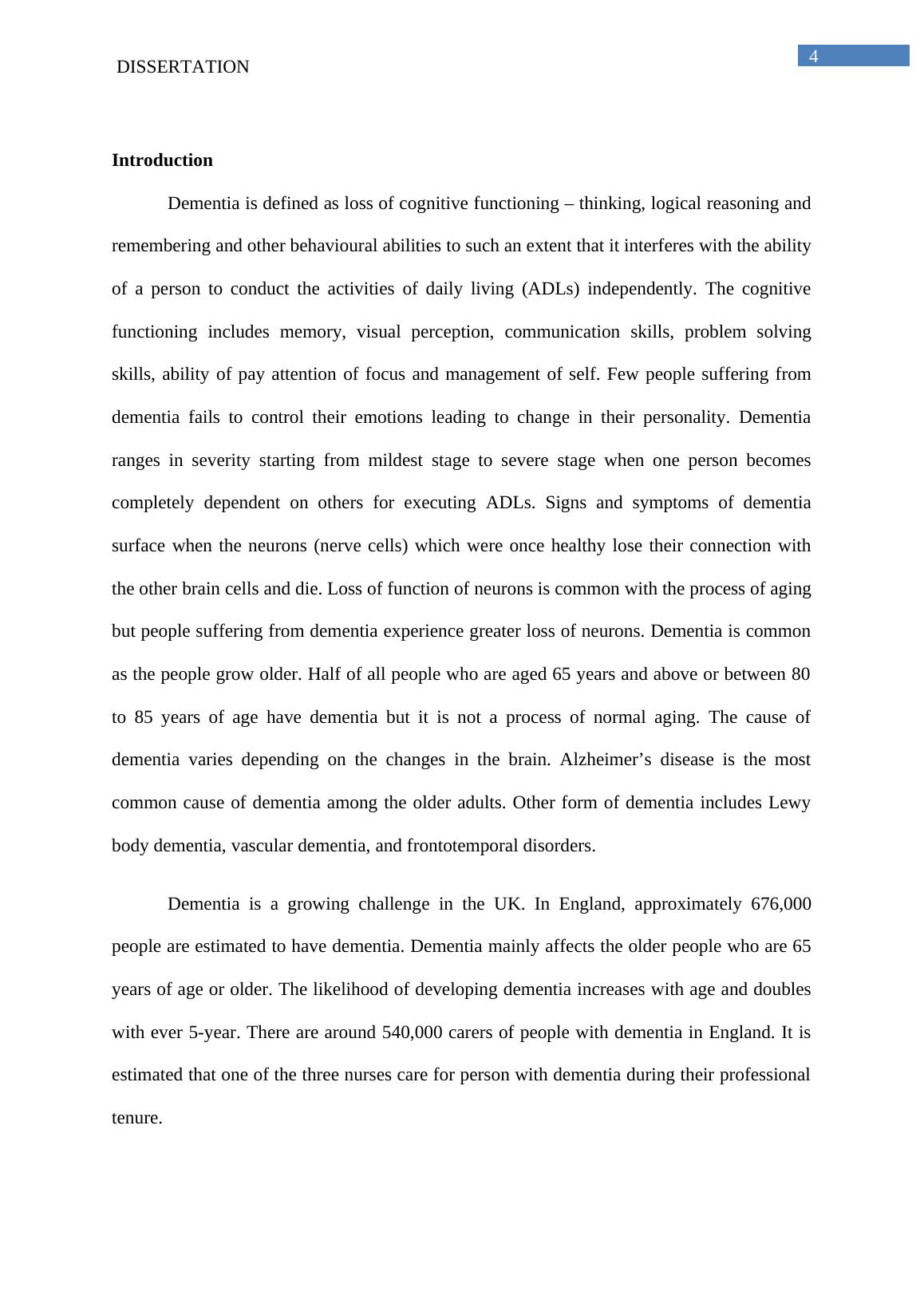
5DISSERTATION
Depressive symptoms are common among the older people. However, in case of the
older adults (aged between 65 to 85 years) who are suffering from dementia, sustained and
disabling depressive episodes are more common in comparison to the age-matched controls
without dementia (Kitching 2015). The overall incidence of depression is 30% among the
patient suffering from vascular dementia and Alzheimer. The value is over 40% among the
dementia patients who are associated with Parkinson’s and Huntington disease (Kitching
2015). The symptoms and the signs of the depressive disorder among the dementia patient
cannot be differentiated with depressive symptoms of other patients. Mood of the patients
with dementia remains low and is characterised with irritability, anger, and increased level of
anxiousness. It is also associated with disturbed biological rhythms during sleep energy and
appetite. Patient mainly have negative mood along with a sense of hopelessness, guilt along
with a tendency of self-harm. The major depressive disorders develop within few weeks and
or months after the initial onset of dementia (Pema et al. 2019). Leyhe et al. (2017) are of the
opinion that the healthcare practitioners who are caring for the people suffering from
dementia must be alert about the major depressive symptoms associated with dementia, as
this will require specific management strategies.
Anti-depressants are one of the commonly perspective drugs that are used for the
treatment of depressive symptoms among the older adults with dementia. The commonly
used antidepressant includes serotonin re-uptake inhibitors (SSRI). SSRIs are regarded as
first line of drug that are used to the treatment of depression instead of tricyclics
antidepressants. Antidepressant is hypothesized to have neuro-protective effects that help in
improving the overall cognition and memory of the older adults with dementia. However,
little is known about the long term outcome of use of anti-depressants among the older adults
with dementia (Wang et al. 2016). Wang et al. (2016) are of the opinion that the older adults
with dementia between the age group of 65 to 85 years are often under-represented in the
Depressive symptoms are common among the older people. However, in case of the
older adults (aged between 65 to 85 years) who are suffering from dementia, sustained and
disabling depressive episodes are more common in comparison to the age-matched controls
without dementia (Kitching 2015). The overall incidence of depression is 30% among the
patient suffering from vascular dementia and Alzheimer. The value is over 40% among the
dementia patients who are associated with Parkinson’s and Huntington disease (Kitching
2015). The symptoms and the signs of the depressive disorder among the dementia patient
cannot be differentiated with depressive symptoms of other patients. Mood of the patients
with dementia remains low and is characterised with irritability, anger, and increased level of
anxiousness. It is also associated with disturbed biological rhythms during sleep energy and
appetite. Patient mainly have negative mood along with a sense of hopelessness, guilt along
with a tendency of self-harm. The major depressive disorders develop within few weeks and
or months after the initial onset of dementia (Pema et al. 2019). Leyhe et al. (2017) are of the
opinion that the healthcare practitioners who are caring for the people suffering from
dementia must be alert about the major depressive symptoms associated with dementia, as
this will require specific management strategies.
Anti-depressants are one of the commonly perspective drugs that are used for the
treatment of depressive symptoms among the older adults with dementia. The commonly
used antidepressant includes serotonin re-uptake inhibitors (SSRI). SSRIs are regarded as
first line of drug that are used to the treatment of depression instead of tricyclics
antidepressants. Antidepressant is hypothesized to have neuro-protective effects that help in
improving the overall cognition and memory of the older adults with dementia. However,
little is known about the long term outcome of use of anti-depressants among the older adults
with dementia (Wang et al. 2016). Wang et al. (2016) are of the opinion that the older adults
with dementia between the age group of 65 to 85 years are often under-represented in the
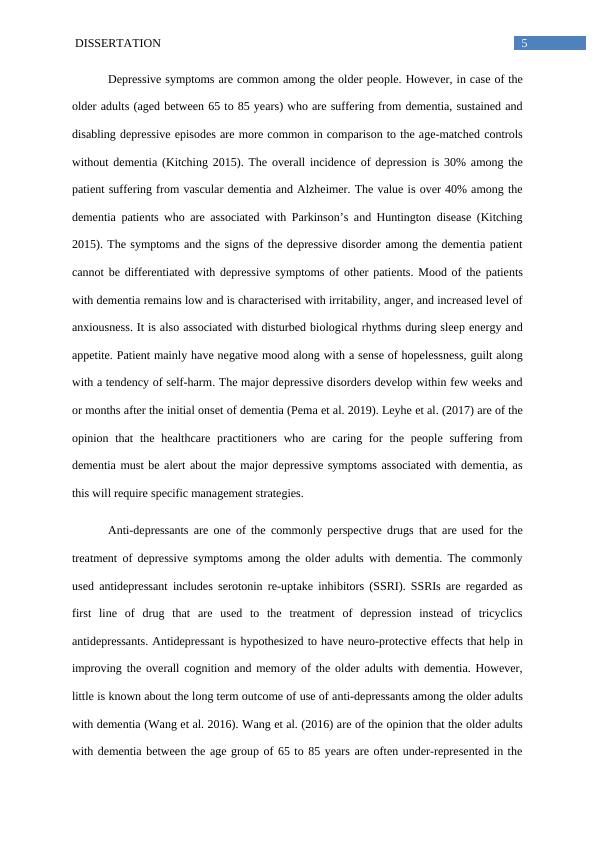
6DISSERTATION
clinical trials of the anti-depressants. Few of the primary studies conducted so far in order to
study the effect of use of the anti-depressants among the older adults with dementia
highlighted potentially different and complex relationships. A study conducted by Lee et al.
(2016) stated that prolong use of the anti-depressant among the older adults with dementia
increases the severity of the disease in the long run. The systematic review and meta-analysis
conducted by Moraros et al. (2017) over the older adults with dementia highlighted prolong
use of the anti-depressant among the older adults with dementia with early onset of dementia
before the age of 65 years increases the severity of the disease at the age of 70 to 75 years
leading to severe neurological impairment along with hamper in the cognitive function. On
the other hand, the systematic review of the randomised control trial conducted by Orrell
(2015) over six studies showed that use of non-pharmacological interventions like
psychological interventions is effective in reducing severity of depression and anxiety among
the older adults with dementia. The non-pharmacological interventions are found to be more
effective in comparison of the pharmacological interventions like use of anti-depressants.
However, overall systematic review of the studies conducted over the effect of the anti-
depressant among the older adults is also limited and this hampers the proper implementation
of the evidence-based practice under the setting of mental health nursing. Moreover, there are
differing opinions about the importance of the pharmacological and non-pharmacological
interventions used for the treatment of depression among the older adults with dementia.
Thus the following systematic review will be guided towards the detection of the
efficacy of the anti-depressant among the older adults with dementia. The research aims and
objectives will be designed based on the detailed analysis of the research gap done through
the conduction of a detailed literature review. The systematic review of the primary studies
conducted over the use of anti-depressant among the dementia patient will be helpful in
highlighting the pros and cons behind the administration of the anti-depressant and at the
clinical trials of the anti-depressants. Few of the primary studies conducted so far in order to
study the effect of use of the anti-depressants among the older adults with dementia
highlighted potentially different and complex relationships. A study conducted by Lee et al.
(2016) stated that prolong use of the anti-depressant among the older adults with dementia
increases the severity of the disease in the long run. The systematic review and meta-analysis
conducted by Moraros et al. (2017) over the older adults with dementia highlighted prolong
use of the anti-depressant among the older adults with dementia with early onset of dementia
before the age of 65 years increases the severity of the disease at the age of 70 to 75 years
leading to severe neurological impairment along with hamper in the cognitive function. On
the other hand, the systematic review of the randomised control trial conducted by Orrell
(2015) over six studies showed that use of non-pharmacological interventions like
psychological interventions is effective in reducing severity of depression and anxiety among
the older adults with dementia. The non-pharmacological interventions are found to be more
effective in comparison of the pharmacological interventions like use of anti-depressants.
However, overall systematic review of the studies conducted over the effect of the anti-
depressant among the older adults is also limited and this hampers the proper implementation
of the evidence-based practice under the setting of mental health nursing. Moreover, there are
differing opinions about the importance of the pharmacological and non-pharmacological
interventions used for the treatment of depression among the older adults with dementia.
Thus the following systematic review will be guided towards the detection of the
efficacy of the anti-depressant among the older adults with dementia. The research aims and
objectives will be designed based on the detailed analysis of the research gap done through
the conduction of a detailed literature review. The systematic review of the primary studies
conducted over the use of anti-depressant among the dementia patient will be helpful in
highlighting the pros and cons behind the administration of the anti-depressant and at the
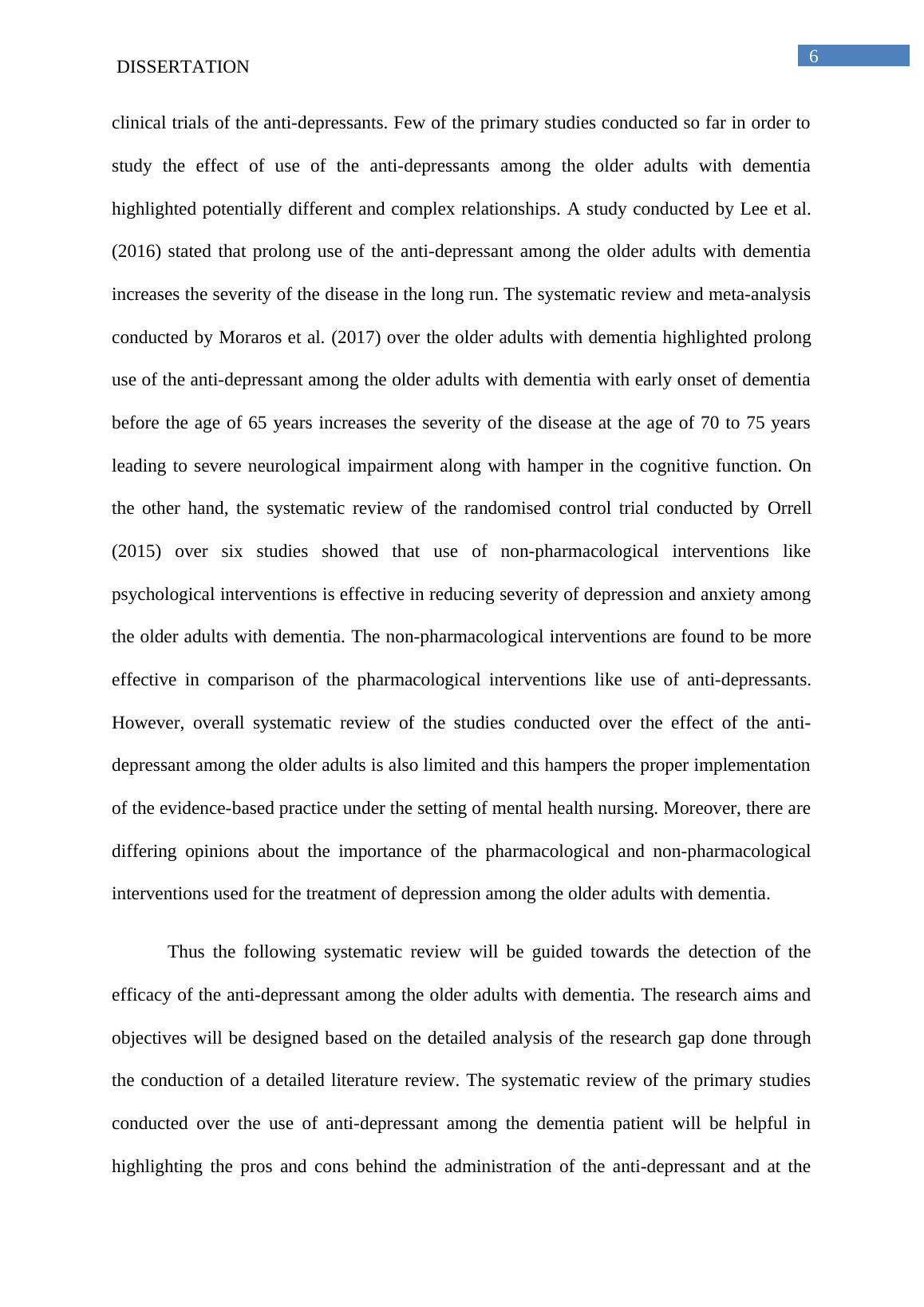
7DISSERTATION
same time will help to evaluate any alternative treatments that are used for the treatment of
depression.
Thus the main research questions over which this systematic review will be designed
include effect of the anti-depressant among the older adults with dementia between the age
group of 65 to 85 years.
Literature Review
Dementia and depression are the two of the common psychiatric symptoms of the older adults
with dementia. Although there are approaches that help in the early identification of the
underlying causes of dementia, implementation of the proper interventions for the effective
management of the depressive symptoms of dementia remain extremely challenging. Late life
depression among the older adults with dementia is results in the cognitive impairment.
Alternatively dementia is related to an increased risk of developing depressive symptoms.
Due to the abundance, both the syndromes often co-occur among the older adults.
Association of depression and dementia among the older adults
It is estimated that in England nearly 3676.250 older people resides in 10,331
residential aged care settings and costing approximately £16 billion through direct funding
from the government. Over 30% of the people with dementia in UK reside under this setting
with £9 billion annual cost of care. In the residential aged care settings or in nursing homes,
24.6% of people are admitted with moderate dementia while 40% included severe dementia.
The behavioural symptoms are higher among the older adults with severe dementia and at
percentage amount of 87% of the total population admitted in the nursing homes. The
prescriptions of the anti-psychotic medications are also increased by 20% in the past 10 years
in order to manage the behavioural findings (Bisla et al. 2010). However, given the size of
the dementia population and the severity of the psychosis symptoms among the dementia
same time will help to evaluate any alternative treatments that are used for the treatment of
depression.
Thus the main research questions over which this systematic review will be designed
include effect of the anti-depressant among the older adults with dementia between the age
group of 65 to 85 years.
Literature Review
Dementia and depression are the two of the common psychiatric symptoms of the older adults
with dementia. Although there are approaches that help in the early identification of the
underlying causes of dementia, implementation of the proper interventions for the effective
management of the depressive symptoms of dementia remain extremely challenging. Late life
depression among the older adults with dementia is results in the cognitive impairment.
Alternatively dementia is related to an increased risk of developing depressive symptoms.
Due to the abundance, both the syndromes often co-occur among the older adults.
Association of depression and dementia among the older adults
It is estimated that in England nearly 3676.250 older people resides in 10,331
residential aged care settings and costing approximately £16 billion through direct funding
from the government. Over 30% of the people with dementia in UK reside under this setting
with £9 billion annual cost of care. In the residential aged care settings or in nursing homes,
24.6% of people are admitted with moderate dementia while 40% included severe dementia.
The behavioural symptoms are higher among the older adults with severe dementia and at
percentage amount of 87% of the total population admitted in the nursing homes. The
prescriptions of the anti-psychotic medications are also increased by 20% in the past 10 years
in order to manage the behavioural findings (Bisla et al. 2010). However, given the size of
the dementia population and the severity of the psychosis symptoms among the dementia
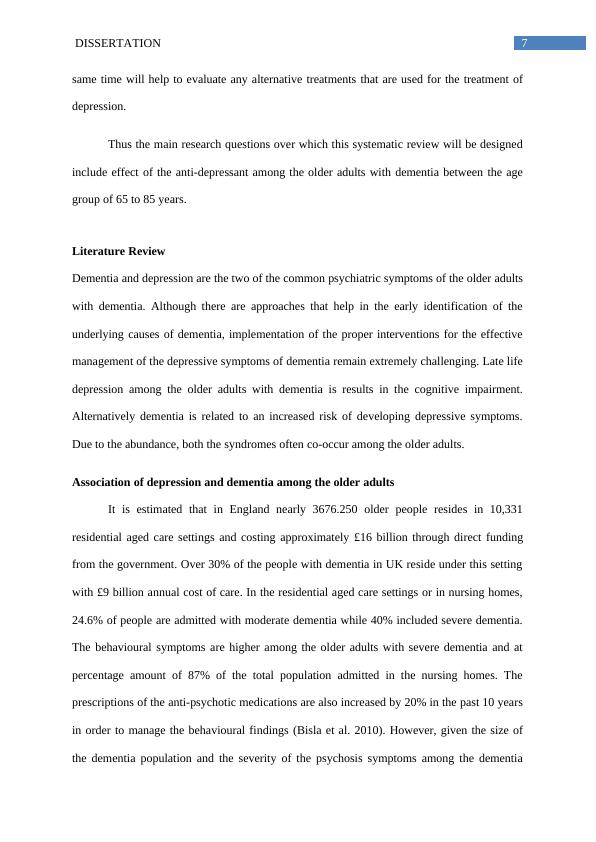
End of preview
Want to access all the pages? Upload your documents or become a member.
Related Documents
Evidence-based studies on pharmacological and non-pharmacological interventions for dementia patients: An annotated bibliographylg...
|14
|4347
|486
Nursing: Alcohol Withdrawal Risk Assessment, Cognitive Assessment, Falls Assessment, Functional Assessment, Nutritional Assessmentlg...
|13
|3244
|35
Schizophrenialg...
|8
|1859
|25
Pain Management in Dementialg...
|19
|3130
|20
Parkinson's disease - Symptomslg...
|7
|1693
|23
The imaging techniques such as magneticlg...
|5
|1010
|15
